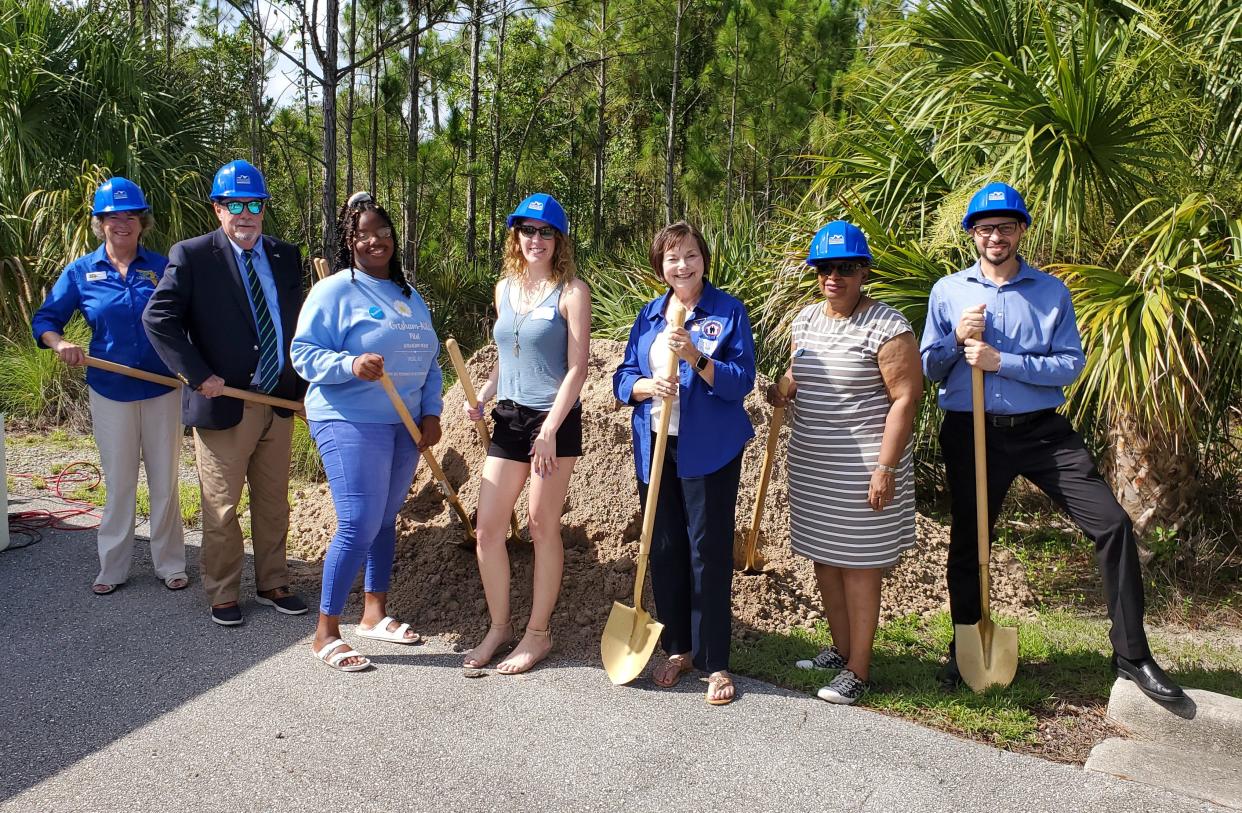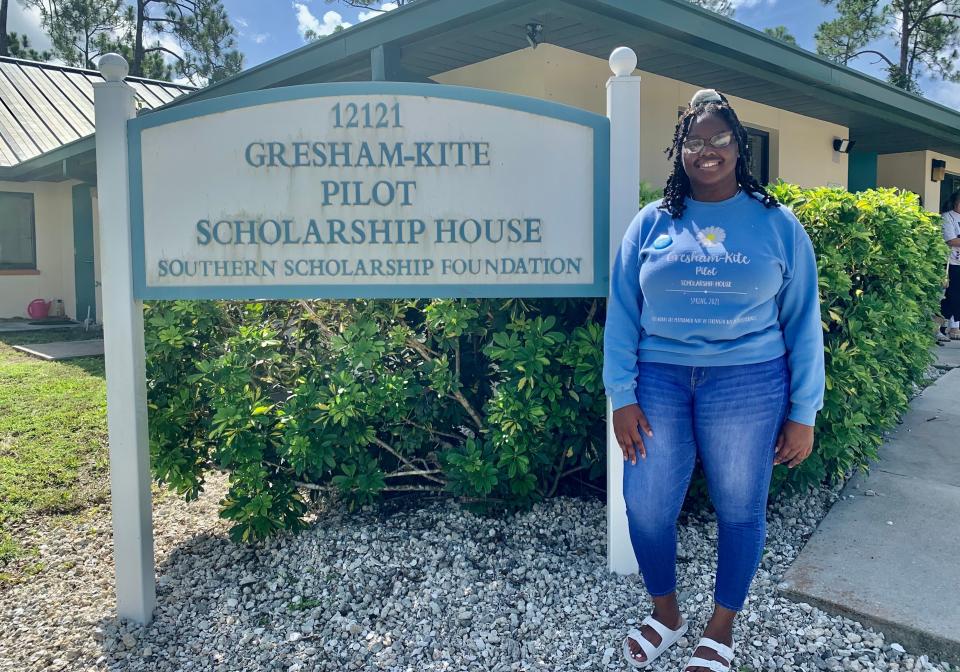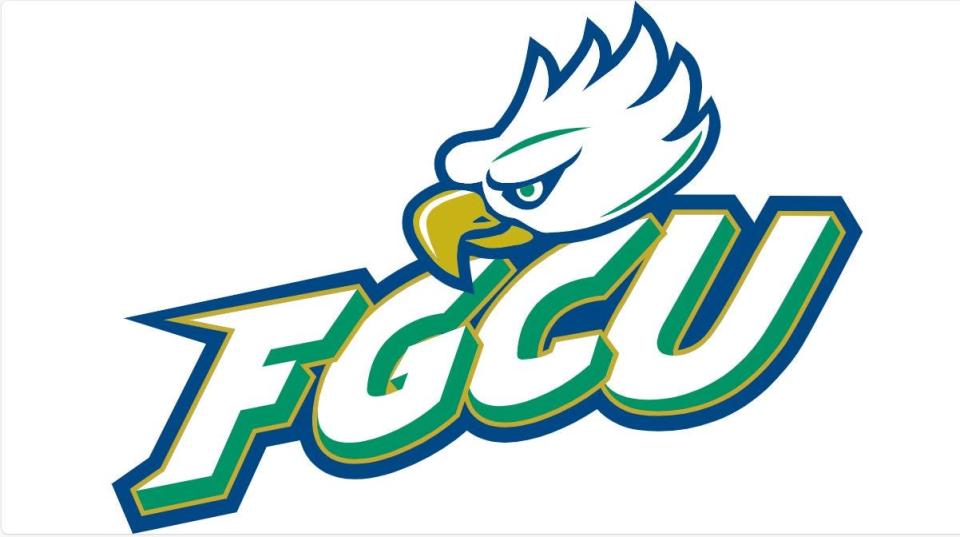Get your application in: More free student housing opens at Florida Gulf Coast University

Seventeen more students at Florida Gulf Coast University will enjoy free housing in the 2024-2025 school year, thanks to a partnership between the school, a local club and a nonprofit focused on student housing.
Southern Scholarship Foundation, a 501(c)3 nonprofit, and FGCU teamed up 20 years ago in order to build three houses that would be free for FGCU students to live in while in attendance. The houses are sponsored by Florida District Pilot International in conjunction with the Pilot Scholarship House Foundation in Fort Myers, per Southern Scholarship Foundation's website.
After a four-year build process interrupted by the COVID-19 pandemic and Hurricane Ian, the second of the three houses was dedicated Saturday afternoon.
The program, which was first piloted in 1953 and "started with a handful of young men living in an abandoned army barracks," per Southern Scholarship Foundation's website, has grown into a much larger program, with dozens of houses across Florida, in Tallahassee, Gainesville and Fort Myers.
For many students, the free housing they provide removes the final barrier from the road to college.
Vanessa Aguilar is a first-generation college student. Her parents, who are originally from the state of Morelos in Mexico, live in Lake Placid, Florida and work as blueberry pickers. Growing up, she said, she saw how hard her parents and aunts and uncles worked to make sure their kids were healthy – often at the expense of their own health.
"Since I was little, I’ve seen my family struggle with the opportunity to find adequate healthcare," she said. "And I think a lot of them don’t have insurance because they can’t get it. One of my uncles has pretty advanced diabetes because he wasn’t able to check himself earlier on. My mom has hypertension because she always put us first for dentist or doctor’s appointments."
That helped grow her determination to work in healthcare, she said, and she wants to help others in positions similar to her parents, who may need healthcare but can't find it or afford it. An intern at the Bonita Springs NCH cardiac rehabilitation facility, she plans to become a physician's assistant, and says none of this would have been possible without the housing provided by FGCU and Southern Scholarship Housing.
When I got into FGCU "I was definitely scared at first, wondering how my family was going to provide," Aguilar said. "Originally, I was going to live in the freshman dorm and that was $4,000 a semester. I was like, I’m not going to go. I thought I was going to be in debt.
"I definitely think if it got to a point that I couldn’t afford living there anymore, I would have left FGCU," Aguilar said.
When she got the email saying she'd been accepted into the scholarship housing, suddenly, a college degree at FGCU seemed attainable. She graduates in May, debt-free, with a degree in Exercise Science, and hopes to go to PA school next year.
That is exactly what this program is supposed to do, said Southern Scholarship Foundation CEO and President Shawn Woodin.
"It eliminates that cost barrier to being away from home."
Saving money
While apartment costs may be decreasing in Southwest Florida, the average cost of a one-bedroom in the region remains about $2,200, per the Waller, Weeks and Johnson Rental Index, which is updated monthly, FGCU professor Shelton Weeks says. Average rent for a one-bedroom in the U.S. is just over $1,900 a month.
Per a study out of Rent.com, Florida's median rent sits at $2,095, and the average rent for a one bedroom in Naples is $1,922, below the national average calculated by the Waller, Weeks and Johnson Rental Index.
Still, for college students and their families, rental costs can be a stretch on top of tuition and other expenses.

On average, students at the scholarship houses pay just $700 a semester, but not in rent. That cover utilities, internet, social events, and food for themselves and their housemates.
That amounts to a savings of roughly $1,800 a month, according to The News-Press / Naples Daily News calculations.
If a student rented a one-bedroom for a year, she could expect to pay more than $26,000. Students living in Malthouse or Gresham Kite pay about $1,400 total for their two semesters at school –– and don't have to deal with an annual lease or pay rent over the summer.
And students who would otherwise live in student housing are saving money, as well.
Freshman Kalee Sands grew up running around FGCU's campus, tagging along with her mother as she got her degree in education, she said. Her mother, who is a single mother to Sands and her twin sister, works as a special education teacher in a Fort Myers middle school.
"She’s inspired me," Sands said. "She’s made me the person I am today. And this scholarship helped us save $40,000. I’m so glad I didn’t have to ask her to reach into her own pocket to help send me to school.
"I’m so grateful I have a second home here."
Southern Scholarship Housing is funded by private donors and an endowment of $900,000, Woodin said. The land upon which they build their houses is typically leased to them for $10 a year by the universities they partner with, but outside of that in-kind support they do not receive any government funding.
Its houses welcome students of all genders, as well as transgender or nonbinary students, Woodin said. They do house students who identify as male or female separately, because they've found students are more comfortable and relaxed living with people who identify as the same gender, Woodin said.
Next year and potentially the following, FGCU's houses will be mixed-gender as they build out the number of people in the house, but long-term, Woodin said, they plan to separate the genders.
Growing up
While the financial help is a huge draw for students, those living in the houses say that the community they've found and the responsibility they enjoy are some of the most rewarding aspects of living in the Malthouse and Gresham-Kite Pilot Scholarship House.
"I learned a lot about myself," said Sands, who says she's grown in confidence socially since moving into the scholarship house. "I’ve learned how to communicate effectively, build a sense of community with the girls also in this house, to open up and get people get to know me on another level.
"Coming in, I was kind of scared of what other people would think of me, in a way, but they’ve accepted who I am and I’m allowed to show that radiant energy that I bring every day."

Too, Aguilar said the program made her more independent, more confident.
"When I first started, I was new, I was really introverted," she said. "I never talked to anyone. But living with 16 other girls definitely gets you out of your bubble. I think that responsibility has definitely made me more responsible, organized and independent. It helped prepare me for adult life after I leave."
"It's cooperative living, which means they work together to share the household," said Woodin. "With 17 people sharing one kitchen, living room, there are systems in place to make sure the house stays clean and students are following rules, being respectful of each other, spaces and items. But we also make sure it is a home.
Students cook dinner together four days a week, clean up together, and are even in charge of budgeting, tracking purchases, and planning for future expenses.
Students can apply to be considered for the free housing at https://southernscholarship.org/. Applications are due by April 1. Students will receive spots based on need and merit.
Students must have a G.P.A. of 3.0 or higher coming out of their previous education or high school, and documented financial need based on the FAFSA.
This article has been updated to include information on sponsor Florida District Pilot International and the Pilot Scholarship House Foundation.
Naples Daily News trending reporter Kendall Little contributed to this article.
Kate Cimini is the Florida Investigative Reporter for the USA TODAY-Network Florida, based at The News-Press and The Naples Daily News. Contact her at 239-207-9369 or kcimini@news-press.com.
This article originally appeared on Fort Myers News-Press: More free student housing opens up at Florida Gulf Coast University

